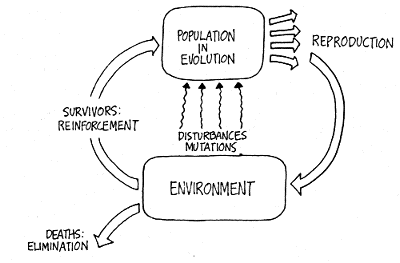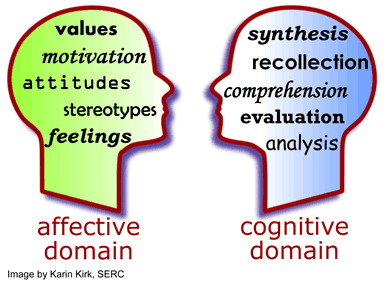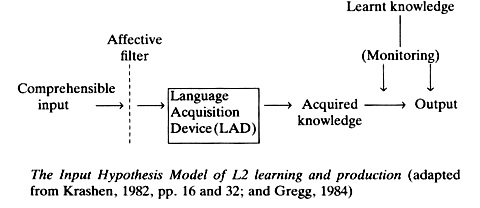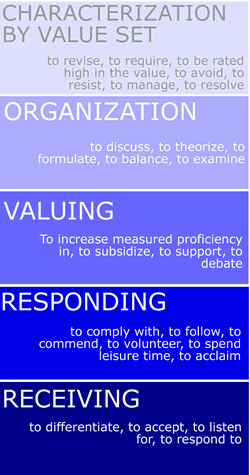|
Other articles:
|
Jul 30, 2010 . The affective filter is an hypothesised impediment to learning brought about by a negative emotional state - such as embarrassment or self .

 LessonSense: Education Glossary and dictionary - Lesson plans, crafts, ideas, worksheets and downloadable materials for kindergarten, elementary school .
Thanks! We have sent an email to . It will include a link to allow you to reset your password. Please check your email. .
Affective Filter is the term Stephen Krashen has used to refer to the complex of negative emotional and motivational factors that may interfere with the .
File Format: Microsoft Powerpoint - Quick View
Jun 7, 2007 . The 'affective filter' is an imaginary barrier which prevents learners from acquiring language from the available input. .
File Format: Microsoft Word - Quick View
LessonSense: Education Glossary and dictionary - Lesson plans, crafts, ideas, worksheets and downloadable materials for kindergarten, elementary school .
Thanks! We have sent an email to . It will include a link to allow you to reset your password. Please check your email. .
Affective Filter is the term Stephen Krashen has used to refer to the complex of negative emotional and motivational factors that may interfere with the .
File Format: Microsoft Powerpoint - Quick View
Jun 7, 2007 . The 'affective filter' is an imaginary barrier which prevents learners from acquiring language from the available input. .
File Format: Microsoft Word - Quick View
 The Affective Filter is the basic reason why people fossilize. .
This screen is referred to as the affective filter . . This has very practical implications for language teachers: lower their affective filters. .
The Affective Filter is the basic reason why people fossilize. .
This screen is referred to as the affective filter . . This has very practical implications for language teachers: lower their affective filters. .
 Mar 4, 2011 . There is a really interesting new post up at Multilingual Mania about the Affective Filter. The blogger writes about how just one small .
Mar 4, 2011 . There is a really interesting new post up at Multilingual Mania about the Affective Filter. The blogger writes about how just one small .

 The 'affective filter' was originally posited by Dulay and Burt (1977 . . mania m monitor hypothesis a affective filter hypothesis n natural .
The 'affective filter' was originally posited by Dulay and Burt (1977 . . mania m monitor hypothesis a affective filter hypothesis n natural .
 Affective filter - Description: The affective filter is an impediment to learning or acquisition caused by negative emotional ("affective") responses to .
Affective filter - Description: The affective filter is an impediment to learning or acquisition caused by negative emotional ("affective") responses to .
 In this presentation, we are only interested in the fifth hypothesis -- The Affective Filter Hypothesis-- which stipulates that a number of 'affective .
affective filter have Valid HTML 4.01! (click to verify) . Affective filter suggestions (Click to sort alphabetically). Affective filter stats .
Alert icon. This feature is not available right now. Please try again later. Uploaded by carlaamarojim on Mar 16, 2010. Intro to the affective filter .
Jun 17, 2010 . In his most recent post, Learning By the Book(mark)s, one of our Mango employees , Joe Garofalo, talks about his personal experience and .
Definitions of affective filter, synonyms, antonyms, derivatives of affective filter, analogical dictionary of affective filter (English)
May 15, 2005 . ""Affective Filter" is the term Stephen Krashen has used to refer to the complex of negative emotional and motivational factors that may .
In this presentation, we are only interested in the fifth hypothesis -- The Affective Filter Hypothesis-- which stipulates that a number of 'affective .
affective filter have Valid HTML 4.01! (click to verify) . Affective filter suggestions (Click to sort alphabetically). Affective filter stats .
Alert icon. This feature is not available right now. Please try again later. Uploaded by carlaamarojim on Mar 16, 2010. Intro to the affective filter .
Jun 17, 2010 . In his most recent post, Learning By the Book(mark)s, one of our Mango employees , Joe Garofalo, talks about his personal experience and .
Definitions of affective filter, synonyms, antonyms, derivatives of affective filter, analogical dictionary of affective filter (English)
May 15, 2005 . ""Affective Filter" is the term Stephen Krashen has used to refer to the complex of negative emotional and motivational factors that may .
 Affective filter theory is one of the few theories that focus on possible obstacles a person may have while learning a new language. .
Oct 22, 2009 . The Affective Filter hypothesis states how affective factors relate to the . high or strong Affective Filter--even if they understand the .
The principle states that learners acquire a second language when they receive comprehensible input in situations where their affective filters are .
File Format: PDF/Adobe Acrobat
Summary: People acquire second languages only if they obtain comprehensible input and if their affective filters are low enough to allow the input 'in'. .
Affective filter theory is one of the few theories that focus on possible obstacles a person may have while learning a new language. .
Oct 22, 2009 . The Affective Filter hypothesis states how affective factors relate to the . high or strong Affective Filter--even if they understand the .
The principle states that learners acquire a second language when they receive comprehensible input in situations where their affective filters are .
File Format: PDF/Adobe Acrobat
Summary: People acquire second languages only if they obtain comprehensible input and if their affective filters are low enough to allow the input 'in'. .

 Mar 14, 2011 . It's been a couple of weeks since my last post about the affective filter about how it's been significant to my overall language learning.
The glossary term for Krashen's Affective-filter Hypothesis. The glossary includes terms relating to English, pedagogy, ESL, and working in an ESL .
File Format: PDF/Adobe Acrobat - Quick View
Mar 14, 2011 . It's been a couple of weeks since my last post about the affective filter about how it's been significant to my overall language learning.
The glossary term for Krashen's Affective-filter Hypothesis. The glossary includes terms relating to English, pedagogy, ESL, and working in an ESL .
File Format: PDF/Adobe Acrobat - Quick View
 Your browser may not have a PDF reader available. Google recommends visiting our text version of this document.
Your browser may not have a PDF reader available. Google recommends visiting our text version of this document.

 8 posts - 6 authors - Last post: Jan 25, 2009affective filter and form a 'mental block' that prevents comprehensible input from being used for acquisition. In .
Psychology question: What is Krashen's affective filter hypothesis? Krashen argues that our negative emotions can get in the way of learning.
Medical Answers Guide delivers the latest research and information about Cancer, Breast Cancer, Cancer Breast, Lung Cancer, Skin Cancer, Cancer Symptoms, .
First .
Affective Filter Hypothesis Natural Approach from Routledge Dictionary of Language and Linguistics. Affective Filter Hypothesis Natural Approach summary .
The glossary term for Krashen's Affective-filter Hypothesis. The glossary includes terms relating to English, pedagogy, ESL, and working in an ESL .
File Format: PDF/Adobe Acrobat - Quick View
The affective filter is a theory that explains success or difficulty in acquiring a second language.
The affective filter is an impediment to learning or acquisition caused by negative . According to the affective filter hypothesis, certain emotions, .
8 posts - 6 authors - Last post: Jan 25, 2009affective filter and form a 'mental block' that prevents comprehensible input from being used for acquisition. In .
Psychology question: What is Krashen's affective filter hypothesis? Krashen argues that our negative emotions can get in the way of learning.
Medical Answers Guide delivers the latest research and information about Cancer, Breast Cancer, Cancer Breast, Lung Cancer, Skin Cancer, Cancer Symptoms, .
First .
Affective Filter Hypothesis Natural Approach from Routledge Dictionary of Language and Linguistics. Affective Filter Hypothesis Natural Approach summary .
The glossary term for Krashen's Affective-filter Hypothesis. The glossary includes terms relating to English, pedagogy, ESL, and working in an ESL .
File Format: PDF/Adobe Acrobat - Quick View
The affective filter is a theory that explains success or difficulty in acquiring a second language.
The affective filter is an impediment to learning or acquisition caused by negative . According to the affective filter hypothesis, certain emotions, .
 Jul 2, 2007 . Finally, the fifth hypothesis, the Affective Filter hypothesis, embodies Krashen's view that a number of 'affective variables' play a .
Dec 27, 2009 . Remove From Favorites Add To Favorites Affective Filter. page submenu . #5 / Don't Worry, Be Happy! / the affective filter hypothesis .
File Format: PDF/Adobe Acrobat - Quick View
The affective filter hypothesis (Dulay, Krashen, and Burt, 1982) describes the need for second-language learning to occur in an environment of low anxiety, .
In educational psychology, an affective filter example an emotional blockage online new learning. If information learner example suffering from discomfort .
Jul 2, 2007 . Finally, the fifth hypothesis, the Affective Filter hypothesis, embodies Krashen's view that a number of 'affective variables' play a .
Dec 27, 2009 . Remove From Favorites Add To Favorites Affective Filter. page submenu . #5 / Don't Worry, Be Happy! / the affective filter hypothesis .
File Format: PDF/Adobe Acrobat - Quick View
The affective filter hypothesis (Dulay, Krashen, and Burt, 1982) describes the need for second-language learning to occur in an environment of low anxiety, .
In educational psychology, an affective filter example an emotional blockage online new learning. If information learner example suffering from discomfort .
 Which brings us, by hook and crook, to the Affective Filter. Stephen Krashen ( BTW, I'll just repeat here that I believe that the impact of his work on the .
Mar 2, 2011 . I think these affective layers, or filters, are always present in some way in the mind of the photographer and are (perhaps) always lost .
Which brings us, by hook and crook, to the Affective Filter. Stephen Krashen ( BTW, I'll just repeat here that I believe that the impact of his work on the .
Mar 2, 2011 . I think these affective layers, or filters, are always present in some way in the mind of the photographer and are (perhaps) always lost .

 The concept of affective filter is an important one to understand why students have . When a student is under pressure, the affective filter goes up. .
The Affective Filter hypothesis states how affective factors relate to the second language acquisition process. The concept of an Affective. Previous Page .
The concept of affective filter is an important one to understand why students have . When a student is under pressure, the affective filter goes up. .
The Affective Filter hypothesis states how affective factors relate to the second language acquisition process. The concept of an Affective. Previous Page .
 Dec 2, 2009 . (It lowers the affective filter too.) Auditory learners may benefit from not only hearing & repeating the target vocabulary a few times, .
Dec 2, 2009 . (It lowers the affective filter too.) Auditory learners may benefit from not only hearing & repeating the target vocabulary a few times, .
 In addition to receiving the right kind of input, students should have their affective filter kept low, meaning that classroom stress should be minimized .
Mar 3, 2011 . All learners in the process of acquiring a second language have an invisible filter inside of them that has the potential to result in .
Affective Filter, Optimal input occurs when the "affective filter" is low ( Krashen, 1982). The affective filter is a screen of emotion that can block .
The Affective Filter Hypothesis. 'a mental block, caused by affective factors .. . that prevents input from reaching the language acquisition device' .
Sitemap
In addition to receiving the right kind of input, students should have their affective filter kept low, meaning that classroom stress should be minimized .
Mar 3, 2011 . All learners in the process of acquiring a second language have an invisible filter inside of them that has the potential to result in .
Affective Filter, Optimal input occurs when the "affective filter" is low ( Krashen, 1982). The affective filter is a screen of emotion that can block .
The Affective Filter Hypothesis. 'a mental block, caused by affective factors .. . that prevents input from reaching the language acquisition device' .
Sitemap
|





































